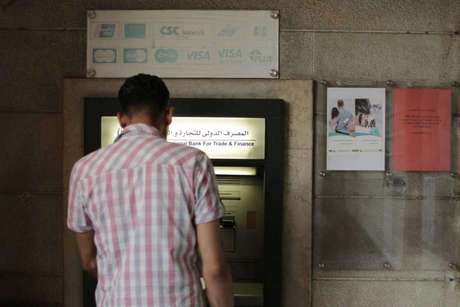Syrian Pound at New Low as Crisis Roils Neighboring Lebanon

The Syrian pound hit a record low Monday amid the country's grinding civil war, now in its ninth year, and as a financial and political crisis roils neighboring Lebanon, Syria's economic lung.
When Syria's conflict erupted in March 2011, a dollar was valued at 47 pounds. On Monday, it traded at over 920 Syrian pounds at some exchange shops in the capital of Damascus -- a sharp drop from recent days.
The currency's collapse could throw more Syrians into poverty as prices of food and commodities increase sharply, putting more pressure on Syrian President Bashar Assad's government, already reeling under international sanctions. Eight out of 10 Syrians make less than $100 a month, according to the U.N.
For decades, Lebanon with its open market economy and free banking has served as Syria's main economic and financial gateway to the world. Many Syrians have kept their money in Lebanese banks, particularly since the Syrian conflict erupted in 2011 with mass protests against Assad.
Lebanon is also home to tens of thousands of Syrian workers who regularly transfer much of their earnings to families back home.
The Syrian pound began losing some of its value earlier this year as Western countries tightened sanctions on Damascus. Drop in remittances also affected the pound and many Syrians started buying dollars to preserve their savings.
In November, the financial crisis in Lebanon worsened amid mass protests against the government, leading Lebanese banks to impose capital controls and preventing many Syrian depositors from withdrawing large sums from their accounts. The Lebanese crisis has also affected Syrians working in the tiny Arab country.
"We no longer eat meat or chicken. We live only on rice and bulgur," said Donia Othman, 39, a mother of two and an employee at a five-star hotel in Damascus who saw her purchase power dramatically drop over the past months.
The Syrian pound went into free fall last month, dropping from about 700 to 820 to the dollar on the black market. Last year, it stayed stable at around 500 per dollar. The official rate has remained stable at 434 pounds to the dollar.
Demand for basic foodstuffs has gone down because people are only buying essential needs.
A minimarket owner in Damascus said sales dropped dramatically, more than 50% as prices rose between 20% and 25% in recent weeks.
"A customer who used to buy two kilograms (4.4 pounds) of sugar is now buying only one kilogram," said the man who spoke on condition of anonymity, fearing retribution. He added that the price of a kilogram of sugar increased from 300 pounds to 400 pounds.
The crash of the pound comes at the onset of winter, raising concerns of a spike in prices of diesel, which many Damascus residents rely on for heating. Although each family is allotted 400 liters of diesel during the winter season at a subsidized price, those who want more will have to get from the black market, where the price is more than double.
Economist Abdul-Qader Azzouz said the Lebanese crisis has negatively affected the situation in Syria.
"There are many issues in common between Syria and Lebanon," he said, adding that one of the initial reasons behind the pound's decrease in value was that many Syrians transferred their money from Syrian banks to those in Lebanon.
Political analyst Taleb Ibrahim said many of those Syrians who deposited money in Lebanese banks now regret it and are eager to get their money back as soon as possible. Also, the difference in the exchange rate between the official and the black market one has prompted many expatriates to refrain from sending dollars to their families through the central bank.
In late November, Assad granted all civil servants, militants and retirees their first salary raise in three years.
"Wars are always exhausting and devastating for the state. It's normal to suffer economically," said Syrian lawmaker Nidal Hamideh. "I think that those who had endured eight years of wars, killing, shells and death, can endure the economic siege."



